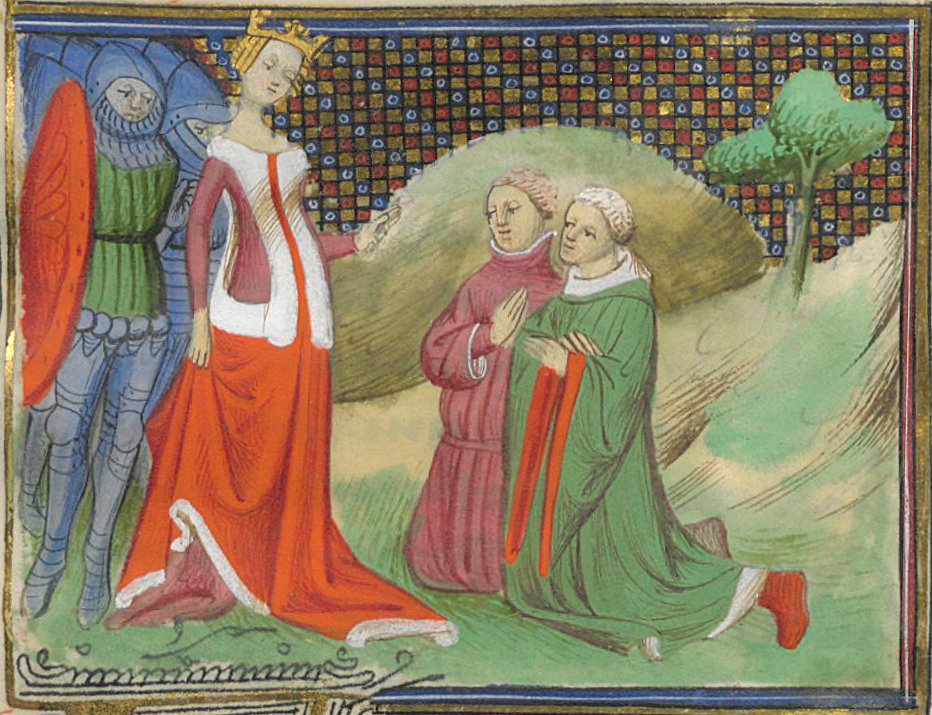When King Edward I (nicknamed “Longshanks,” haha!), Edward II's father, was still ruling England, he was buddies with Hugh's dad. So much so that he arranged a marriage for his granddaughter, Eleanor de Clare, and lil' Hugh. This gave Hugh a good name around nobility.
Fast forward a few years later, while Longshanks's son is on the throne. Eleanor's brother passed away in 1314, so Hugh went to inherit his brother-in-law's lands. Now he was rich. He had a great reputation and beautiful lands.
In 1317 Hugh became King Edward II's chamberlain. He replaced Roger d'Amory's exclusive spot as the King's favorite. What a great life, right? Being the King's best friend, being rich, being well-known... I'd be pretty satisfied. But this wasn't enough for Hugh. He wanted more.
| A beautiful contemporary representation of King Edward II |
The sly and manipulative chamberlain cheated people out of their land. He was cruel and terrible towards anyone that could give him something. And worst of all it was easy for him to get away with it. He was the King's best friend. But maybe Hugh forgot that he wasn't everyone's best friend. Nobody else liked Hugh. Queen Isabella certainly hated him. John of Nottingham, a renowned magician during the time, had a plot to kill him and the King by sticking pins into dolls that looked like them. And if a famous medieval magician hates you, my friend, everybody hates you.
In 1321 the people revolted against Hugh and had him and his father exiled from England for a while. During this brief period in his life he became a pirate. But only about a year later he was let back into England, and became the King's favorite once more. Most of Hugh's enemies were gone someway or another. Hugh was back to the usual stuff: taking land, robbing people, torturing people if they didn't listen to him. He was incredibly powerful once again and practically acted as King. Happily ever after, right? Not for long.
In 1325, Queen Isabella was basically separated from the King. She packed up her bags and went back to France. This separation made the King even more unpopular than he already was. Roger Mortimer, a member of a rivaling family with the Despensers, was exiled and living in France during this time. And so Roger and Isabella both began the very famous affair.
 |
| Hugh and an earl before Isabella |
Accounts of his execution greatly differ, and we will never know how the execution really went. Jean Froissart gave an incredibly colorful description of a horrid execution (which, honestly, is so disturbing that I'm not going to include, for the sake of humanity). In a less sickening—yet still nasty—account, he was hanged on 50 ft. high gallows, but was cut down before he choked to death. He was probably just quartered, hanged, and beheaded, as most contemporaries described. Whichever telling you choose to believe, this is clear: he was grossly executed.
King Edward was forced to abdicate in favor of his son, Edward III. The King, who was crying, said, “I greatly lament that I have so utterly failed my people, but I could not be other than I am.” (Source) It's not really known how he died, but he was most likely murdered.
Poor Edward. I don't think he himself was a really bad guy. Those around him probably just took advantage of his friendliness and power. Hugh certainly did.
Well, Hugh, now you have what you deserve. You tortured and ruined the lives of tons of people—rich and poor—because you wanted lands and power. That all led to you and your friend's death. I hope you're satisfied with your reward, Hugh.
Bibliography
- “29 November 1326 – Hugh Le Despenser.” Execution of the Day. N.p., n.d. Web. 30 July 2014. <http://eotd.wordpress.com/2008/11/29/29-november-1326-hugh-despensers/>.
- “Edward II of England.” Wikipedia. Wikimedia Foundation, 22 July 2014. Web. 30 July 2014. <https://en.wikipedia.org/wiki/Edward_II_of_England>.
- “Hugh Despenser the Younger.” Wikipedia. Wikimedia Foundation, 16 July 2014. Web. 30 July 2014. <https://en.wikipedia.org/wiki/Hugh_Despenser_the_Younger>.
- “Isabella of France.” Wikipedia. Wikimedia Foundation, 24 July 2014. Web. 30 July 2014. <https://en.wikipedia.org/wiki/Isabella_of_France>.
- “November 26 | Hugh Le Despenser the Younger.” A Death a Day. N.p., 26 Nov. 2007. Web. 30 July 2014. <http://deathaday.blogspot.com/2007/11/november-26-hugh-le-despenser-younger.html>.
- Warner, Kathryn. “Edward II's Other Great Favourite, Hugh Despenser the Younger.” Edward II. N.p., 5 Feb. 2006. Web. 30 July 2014. <http://edwardthesecond.blogspot.com/2006/02/edward-iis-other-great-favourite-hugh.html>.
No comments:
Post a Comment